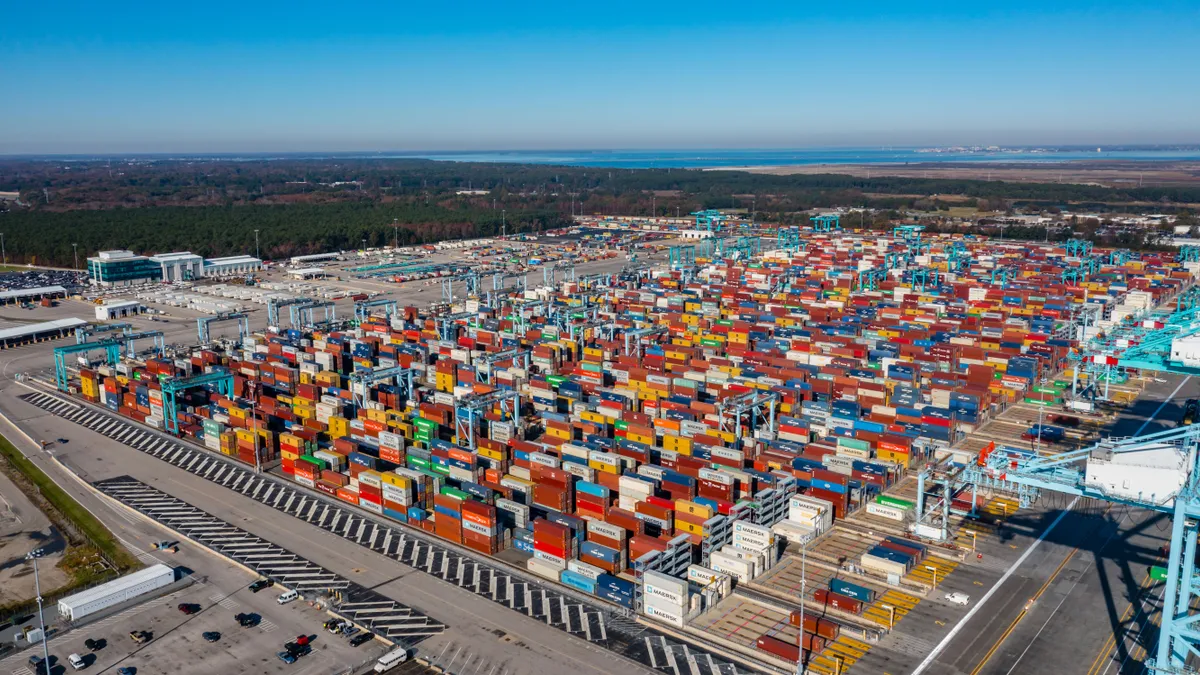Dive Brief:
- Federal Maritime Commission Commissioners Carl Bentzel and Daniel Maffei sent a letter to the World Shipping Council expressing concern that U.S. exporters are having their cargo refused by major ocean carriers — a practice that could be a violation of the Shipping Act.
- The letter outlines the legal requirements that carriers have in the U.S. and notes that companies cannot discriminate against shippers or "unreasonably refuse to deal or negotiate."
- "The World Shipping council itself, per se, is not authorized to suggest anything. They're an association," Bentzel said in an interview. "But we thought that they would be willing to circulate our concerns to all of their members."
Dive Insight:
U.S. agricultural exporters have been vocal about export issues with ocean carriers for weeks. The export market out of Asia has been especially strong recently as U.S. retailers import and restock, which has led rates for cargo departing China to soar while rates for cargo out of the U.S. have not. Ocean carriers have prioritized the movement of empty containers to send them to Asian exporters rather than U.S. exporters.
These issues are leading to "a lot of complaints" for the FMC beginning a couple of months ago, Bentzel said.
"We were getting repeated meetings where people were talking about the frustrations with container access," Bentzel said. "We started to hear that the results of this lack of equipment was that the carriers were increasingly moving to try to get containers, in particular, back and positioned in Asia."
Bentzel said he's seen communications from carriers telling exporters they have a policy not to pick up any more export cargo. Maffei said other complaints show carriers providing 1% to 5% of the containers originally agreed upon in contracts.
"There are certainly some [shippers] who would be willing to pay more just in this particular instance, but they're not even being asked ... their containers are being cut without any negotiation," Maffei said in an interview.
"I believe they all potentially could be violations of the Shipping Act," he said. "Again, if they're actually occurring."
Shippers can bring claims against carriers through the FMC, where Administrative Law Judges will hear the case and the agency can issue fines or award reparations. The agency's Bureau of Enforcement can take similar action against carriers.
When shippers make complaints to the FMC they can go through one of two processes:
- A formal complaint filed with the agency.
- A nonformal communication with commissioners.
So far, the exporters have not filed formal complaints, Bentzel said.
Most shippers want to avoid the formal route if they can, according to Maffei, who said the agency saw the same issue with its detention and demurrage investigation.
"They have a relationship with these carriers, and are very concerned that ... if they make any sort of formal complaints, that they will be harmed in terms of their future relationship with the carrier," he said.
The commissioners hope the carriers will start to see it's in their long-term best interest to provide containers to U.S. exporters.
"I hope that this would give them sort of pause," Bentzel said.
The ideal situation is industry works out a solution on its own, Maffei said, adding that Maersk is one carrier that has been open about talking with exporters in recent weeks. Maersk had an executive talk with exporters at the Agriculture Transportation Coalition mid-year meeting earlier this month, he said.
If that doesn't happen, though, the FMC could take action and launch another, larger investigation that, depending on the outcome, could lead to penalties or fines.
"And as we look into it, it may be something that Congress may act on," Maffei said. The role of Congress in this case would be a modification of the Shipping Act, though if legislators take this step it likely wouldn't be until the next Congress, Maffei said. "It may very well be changed to allow us or some other government group to do something to make sure that there's sufficient containers for exporters because it's just so important."
Figuring out if the decisions by the carriers are purely discriminatory or related to other transportation factors isn't easy, though, Bentzel said.
"In the event that they're denying service, that clearly is a violation of the statute," he said.
The letter from Bentzel and Maffei, the two Democratic Commissioners, comes as the agency is stepping up its scrutiny of the carriers. FMC Commissioner Rebecca Dye met with CEOs of six ocean carriers last week to talk about container issues. And the FMC has expanded the scope of Fact Finding 29, led by Dye, to investigate the container-related practices of carriers operating in alliances that call the ports of Long Beach and Los Angeles, or the Port of New York and New Jersey.















